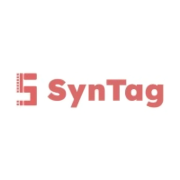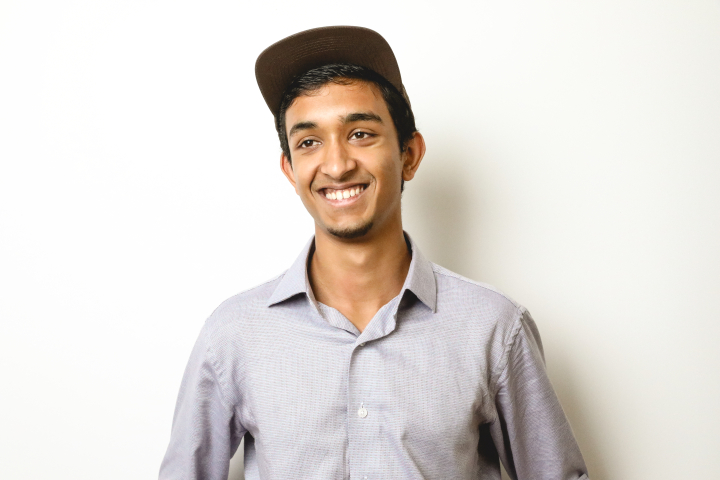Computer Science Major Vikram Khandelwal and SynTag: Transforming Customer Interactions
Reaching out to customer support has often been a test of patience, marked by daunting wait times and encounters with automated systems that feel more like hurdles than helpers.
Now, imagine dialing customer support and, instead of bracing for a lengthy wait, being immediately greeted by an AI bot. Not just any bot, but one that understands your query precisely and offers solutions within seconds.
This scenario isn’t a glimpse into a distant future but the present reality brought to life by SynTag, a pioneering student startup from the University of Maryland’s Department of Computer Science.
Vikram Khandelwal (B.S. '25, computer science; B.S. '25, mathematics), the founder and CEO of SynTag, recognized artificial intelligence's potential to modernize customer interactions. The software leverages AI to transform customer service platforms, offering real-time resolutions, generating dynamic FAQs and significantly reducing response times.
“In the customer support ecosystem, there was a clear need for innovation, which reconsidered the conventional approach,” Khandelwal said. “Our technology stands to make a significant difference.”
This project aligns with Khandelwal's enduring commitment: creating technologies designed to enhance and improve people's lives.
Curiosity to code
Long before founding his startup, Khandelwal's fascination with technology took root at an early age. His pivotal encounter with the world of computer science came in fifth grade when he discovered a Coursera course titled “Introduction to Programming and Python.”
“I was hooked on coding from the beginning because I could create Video Games,” Khandelwal said. “I ended up coding this game called Asteroids, which is just firing on a ship, and you shoot these asteroids that come out of the corners. And that was fun. I kept programming from the fifth to the seventh grade and remember enjoying every moment.”
Despite relocating multiple times—from California to Virginia and finally to Seattle—the constant upheaval could have dampened his burgeoning interest in technology. Instead, these moves set the stage for a deeper engagement with tech.
In ninth grade, Khandelwal navigated the complexities of his high school years, which were marked by significant personal and academic growth. During this time, he discovered computer vision, a technology that fascinated him by innovatively bridging the gap between the digital and the physical.
His passion for technology and a budding interest in sports led him to explore the intersection of these fields in a creative and impactful way.
“In high school, I discovered computer vision, a technology that lets computers understand the world visually,” Khandelwal said. “In the same year, I developed an interest in tennis. Combining these passions, I developed an app to analyze tennis serves, offering feedback to players. This project, spanning more than two years, was more than a technical challenge; it was a journey of discovery. It highlighted computer science's transformative power, showing how it quickly turns ideas into reality. This experience solidified my decision to pursue computer science in college.”
The birth of a startup
Khandelwal's path from a skilled coder to an entrepreneur took shape at the University of Maryland. While at UMD, he faced the widespread issue of leveraging AI to make a difference in people’s lives. This challenge and a critical internship at Fin Tech giant Ramp helped form the inspiration for SynTag.
“While at UMD, I saw firsthand how AI could fundamentally address challenges in customer service,” Khandelwal said. “The inefficiencies I encountered during my internship at Ramp weren't just minor issues; they highlighted a pervasive problem that demanded a solution. It was this realization that inspired the foundation of SynTag.”
 Drawing motivation from his internship and the advent of ChatGPT, Khandelwal launched SynTag in the Fall of 2023.
Drawing motivation from his internship and the advent of ChatGPT, Khandelwal launched SynTag in the Fall of 2023.
“SynTag’s voice-powered AI assistants mimic human speech so closely that it's hard for the unalert listener to tell them apart from real people,” Khandelwal said. “Unlike traditional interactive voice response systems, where customers navigate options by pressing buttons, these assistants engage in natural conversations in English and Spanish, offering immediate responses.”
Brotherly support
In November, SynTag was selected for the 2023-2024 Mokhtarzada Hatchery student startup accelerator program at UMD. The Hatchery—supported by alums and siblings Haroon, Idris and Zeki Mokhtarzada—offers student entrepreneurs workspaces, mentorship and the opportunity for annual funding of up to $10,000 per team.
Khandelwal credits the Hatchery Program for playing a crucial role in fostering the entrepreneurial thinking behind SynTag.
“The guidance from the Mokhtarzada brothers has been invaluable,” Khandelwal shared. “They emphasized the importance of defining our product to appeal to a broad market, not just custom solutions for individual clients. This approach refocused us from merely coding to building a viable business. They also advised on strategic focus, like prioritizing areas where we have a competitive advantage. Their structured biweekly meetings ensured we set and achieved clear goals, keeping us motivated and on track.”
Looking ahead
Khandelwal envisions a future where his platform is not just an addition to customer service ecosystems but a fundamental component.
"I envision SynTag enhancing chat and voice bot integration and changing how we interact with companies moving forward,” Khandelwal said. “SynTag will continue to fit platforms serving customers who seek more personal, understanding interactions.”
SynTag is poised for international expansion, with an exceptionally bright future abroad.
“Latin America’s preference for humanized, conversational customer service makes it a fertile ground for our voice bot technology,” Khandelwal shared. “We aim to support startups looking for scalable customer service solutions and established businesses aiming to enhance their digital interaction platforms. By the end of the year, I anticipate seeing SynTag widely adopted across various Latin American markets, revolutionizing how companies engage with their customers."
In the dynamic landscape of tech startups, SynTag stands out for its innovative solution and journey—a story of ambition, innovation and the power of a supportive community. As the startup moves forward, both it and Khandelwal remain committed to transforming customer service, proving that even the most complex challenges can be met with simple, elegant solutions.
—Story by Samuel Malede Zewdu, CS Communications
###
Other Syntag team members include:
- Max Kaufmann (B.S. ’25, computer science)
- Vivek Nadig (B.S. ’26, computer science)
The Department welcomes comments, suggestions and corrections. Send email to editor [-at-] cs [dot] umd [dot] edu.
